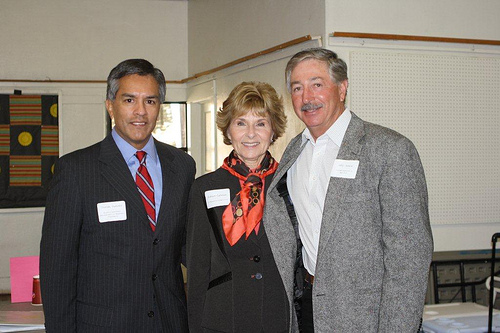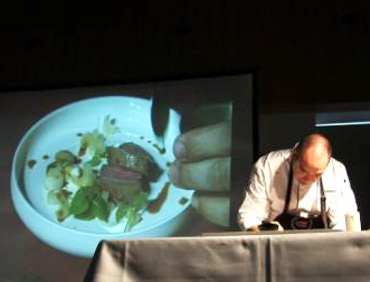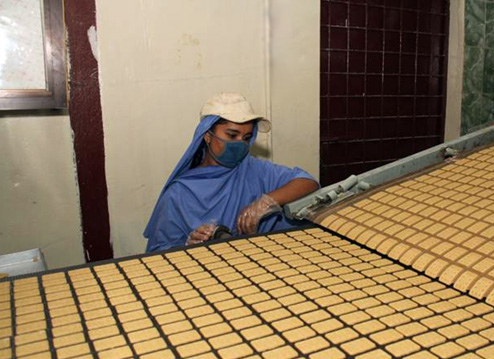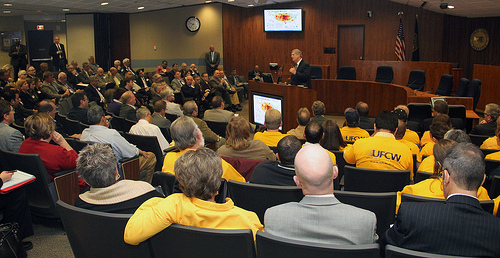
Deputy Thomas Guevara, Deputy Assistant Secretary for Regional Affairs at the Economic Development Administration (left); Colorado Agriculture Commissioner John Salazar (right), and Colleen Callahan of USDA prepare for the morning session at the drought conference. USDA photo.
Over 100 attendees joined Thomas Guevara, Deputy Assistant Secretary for Regional Affairs at the US Department of Commerce Economic Development Administration and Colorado Agricultural Commissioner John Salazar at the second of four regional workshops to outline resources available to assist with drought recovery efforts. The Colorado regional workshop was held at the state fairgrounds in Pueblo earlier this week. The U.S. Department of Agriculture (USDA) is partnering with tribes, local, state and federal partners to hold the workshops. Federal partners include the Department of Commerce, the Small Business Administration, and the Federal Emergency Management Agency.
With over two-thirds of the country in drought, recovery efforts are underway and a new framework for delivery is being developed. Collaboration, coordination and communication were the prevalent themes at the Colorado workshop. These efforts will be needed at all levels of government and our ability to work together is crucial. Read more »
Tags: Arkansas, Colorado, Department of Commerce, Department of Transportation, drought, FEMA, Ohio, President Obama, Small Business Administration, Thomas Guevara, White House
 Environment
Environment

Dutch Chef Eric Troost prepares an upscale dish using U.S. beef during a cooking demonstration for about 130 Belgian chefs Sept. 24. The demo was part of the first U.S. beef tasting event held in Belgium, which was hosted by the Foreign Agricultural Service (FAS) office in The Hague, Netherlands, and the U.S. Meat Export Federation (USMEF). The tasting was part of ongoing efforts to help expand U.S. beef exports to the European Union (EU). (Photo courtesy FAS The Hague)
The European Union (EU) is a relatively new market for U.S. beef exports. It wasn’t until August 2009 when the United States began exporting high-quality beef (marbled with a high fat content) to the EU under a negotiated tariff rate quota for non-hormone treated beef. Read more »
Tags: beef, Belgium, European Union, Exports, FAS, MAP, National Export Initiative, Netherlands, President Obama, The Hague, Trade
 Economic Growth, International, Trade
Economic Growth, International, Trade
On October 16, World Food Day, it is hard to not be struck by how lucky we are in the United States. We have abundant food that costs us less to produce, on a per unit basis, than almost any other country in the world. Our farmers and ranchers produce more than we need, allowing us to be a powerhouse in global exports. And our food supply is among the safest of all the world’s nations.
All that abundance and security has been underpinned by science and know-how. Between the 1940s and the 1970s, agriculture science blossomed in what has become known as the Green Revolution. Thanks to the research done by Norman Borlaug, the “Father of the Green Revolution,” working with researchers around the world, developed high-yielding varieties and modern production practices that helped save untold numbers of people from starvation. Read more »

A Bangladeshi factory worker monitors the production of biscuits made from U.S. donated wheat. The donation was delivered to the World Food Programme, a Foreign Agricultural Service (FAS) McGovern-Dole program participant that works to provide food assistance in more than 73 countries. The biscuits will be distributed to about 2,000 schools in the poorest areas of Bangladesh. (Photo courtesy U.S. Embassy New Dehli)
Approximately 350,000 school children in Bangladesh now have access to a daily snack after the U.S. government recently donated more than 10,000 metric tons of wheat to the country through the Foreign Agricultural Service’s (FAS) McGovern-Dole Food for Education Program. Read more »
Tags: Bangladesh, Dan W. Mozena, FAS, Feed the Future, Food Security, George McGovern, McGovern-Dole Food for Education Program, President Obama, Trade, World Food Prgoramme
 Food Security, International, Trade
Food Security, International, Trade

Agriculture Secretary Tom Vilsack speaks at the opening session of a Federal Drought Workshop in Omaha, NE on Tuesday, Oct. 9, 2012. This was the first of four regional workshops to outline resources available to assist with drought recovery effort.
Agriculture Secretary Tom Vilsack participated in the kickoff of four regional workshops on drought recovery, the first of which was held Tuesday in Omaha, Nebraska. More than 200 people gathered in Omaha to discuss ways to access existing resources and to offer ideas on new efforts to assist those impacted by drought. Read more »
As producers face an historic and ongoing drought today, President Obama and I are doing all we can to help farmers and ranchers mitigate its effects – while helping communities to overcome the economic challenges posed by the drought.
To carry out our work on behalf of communities and producers, USDA has relied on programs authorized by the 2008 Farm Bill. Parts of that law, including authorization of USDA disaster assistance for livestock producers, expired last year. Other aspects of the law expire on October 1st and over the next few months if Congress fails to act. Read more »




